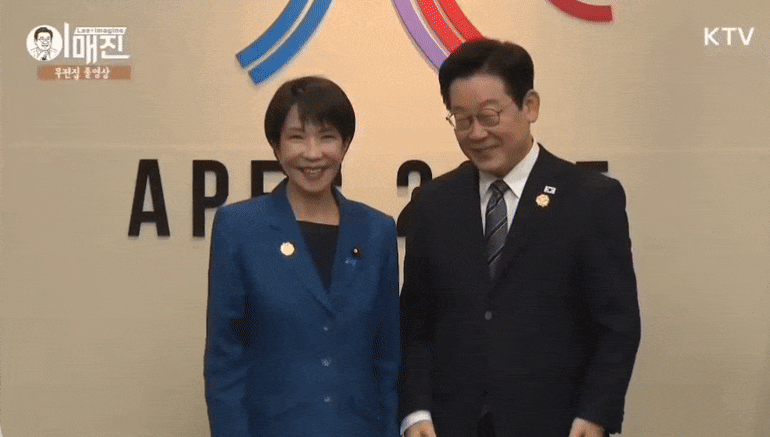Inside Japan’s PM Sanae Takaichi’s Shocking Sleep Habit: She Says She Sleeps Just 2 Hours — What It Means for Leadership and Health
Japan PM sleep habits explained extreme work culture in Japan what is chronic sleep deprivation how lack of sleep affects the brain can sleep deprivation be dangerous why leaders sacrifice sleep how to manage sleep with high-stress job effects of two hours of sleep a night

By YEET Magazine Staff, YEET Magazine
Published November 20, 2025
By YEET Magazine Staff, YEET Magazine
Published November 20, 2025
Top Keywords:
Japan PM Sanae Takaichi sleep schedule
Sanae Takaichi only sleeps two hours
how much sleep does Japan prime minister get
world leaders with little sleep
Japan overwork and sleep deprivation
Sanae Takaichi work ethic controversy
health risks of sleep deprivation for leaders
3am meetings Japan PM

Meta Description:
Japan’s Prime Minister Sanae Takaichi revealed she sleeps only 2–4 hours a night, raising major concerns about overwork, health, and leadership in a country already struggling with burnout culture.

Japan’s Prime Minister, Sanae Takaichi, recently made headlines when she said she typically sleeps only two hours per night, sometimes up to four hours. Her confession has sparked a fierce debate about overwork, health, and the kind of example she is setting as a leader. The Japan Times+2Geo News+2

Who Is Sanae Takaichi?
- Sanae Takaichi is the current Prime Minister of Japan, and notably, she’s one of the first women to lead the country in this role. Geo News
- She’s also the leader of the ruling Liberal Democratic Party (LDP), a position that demands immense responsibility and political pressure. GMA Network+1
- Since taking office, Takaichi has shown a relentless drive: she even held a 3 a.m. staff meeting to prepare for a parliamentary session. The Straits Times
- She’s said she adopted her extreme sleep habit in part because she admired Margaret Thatcher, who was known for functioning on very little rest. The Guardian+1
Her Sleep Confession
In a session with a legislative committee, Takaichi stated:
“I sleep about two hours now, four hours at the longest.” The Japan Times
She added, somewhat casually: “I feel it’s bad for my skin.” www.ndtv.com
This admission has alarmed many because Japan already has a deeply rooted culture of overwork, and the consequences of chronic exhaustion are far from cosmetic. The Straits Times+1
Why Her Schedule Raises Alarms
- Extreme Work Ethic + Mixed Messaging
- By publicly admitting to such low sleep, Takaichi reinforces a hyper-productive, always-on leadership model.
- Critics argue it sends a dangerous message to workers in Japan, where karoshi — death from overwork — is a real and serious social issue. The Guardian
- She has pushed policies that suggest overtime limits might be loosened, which worries labor and health experts. Geo News
- Health Risks
- Experts warn that two hours of sleep per night is nowhere near enough for a healthy adult. Chronic sleep deprivation can impair decision-making, weaken immunity, and increase risks of heart disease. The Guardian
- Leaders who consistently sleep little risk diminished cognitive performance — a problem when making high-stakes political decisions.
- Cultural Impact
- Japan’s work-life balance debate is already tense, and Takaichi’s sleep habits have only intensified conversations. The Straits Times
- Her 3am meeting is being criticized as symbolic: for her, overwork is not just a personal choice. It’s part of how she leads.
How She Justifies It
- Takaichi defends her schedule by saying that she views rest differently: her personal “work-life balance” is sacrificed in service of her political mission. VnExpress Intl.
- She argues that emphasizing health in policy doesn’t have to mean she practices it personally — that part of her leadership is modeled on working at full throttle.
Public Reaction & Consequences
- The public is split: some admire her commitment and stamina, others worry her example could be damaging. The Daily Star+1
- Health experts have called for a more realistic conversation about rest, especially for national leaders.
- Meanwhile, the broader issue remains: how do you balance a country’s work culture when even its top leaders embrace extreme overwork?
Key Takeaway
Sanae Takaichi’s claim that she sleeps only 2–4 hours a night is more than a personal anecdote — it’s a statement about her leadership style, her work ethic, and her vision for Japan. But it also raises very real questions about health, sustainability, and the signals she’s sending to the rest of the country.
If you admire her ambition, you can’t ignore the risks. If you worry about overwork, her lifestyle may be a warning, not a model.
Sources
- The Japan Times: Takaichi says she sleeps only 2–4 hours. The Japan Times
- The Guardian: Sleep schedule debate and work-life balance. The Guardian
- AFP via Geo.tv: Her 3 am meeting and overwork philosophy. Geo News
- The Straits Times: Karoshi and public concern over chronic overwork. The Straits Times
- NDTV: “Bad for my skin” comment, and her modest explanation. www.ndtv.com
Japan’s Prime Minister reveals he sleeps only two hours a night. Experts weigh in on the health risks and what this says about leadership, work culture, and the pressures of governing.
Japan’s Prime Minister Says He Sleeps Just 2 Hours a Night — What It Means for Leaders and Health
In a recent statement, Japan’s Prime Minister shocked the world by revealing that he sleeps only two hours a night. The revelation has sparked debate about work culture, leadership habits, and the limits of human endurance.
Experts say that while some world leaders are famous for minimal sleep, consistently getting only a few hours can have severe health consequences. Chronic sleep deprivation is linked to memory loss, cardiovascular issues, weakened immunity, and poor decision-making.
The Workaholic Leader
The Japanese PM explained that his short sleep schedule allows him to focus on national priorities, international diplomacy, and economic reforms. However, critics warn that such extreme schedules are unsustainable and dangerous, both for the leader and for the team relying on them.
Historically, some of the world’s most powerful figures — including Winston Churchill and Margaret Thatcher — have reportedly functioned on very little sleep. Yet modern research consistently highlights that sleep is critical for cognitive performance, emotional stability, and physical health.
What Experts Say
Dr. Naomi Tanaka, a Tokyo-based sleep researcher, notes:
“Two hours of sleep per night is far below the recommended 7–9 hours for adults. Even if someone appears functional, prolonged deprivation dramatically increases the risk of heart disease, diabetes, and mental health issues.”
She adds that leaders who regularly sacrifice sleep may also impair their judgment, creativity, and problem-solving abilities, which can impact critical national decisions.
Public Reaction
Social media reactions range from admiration to concern. Many users praise the PM for dedication and hard work, while others worry that such an extreme schedule is a dangerous example for ordinary citizens.
Takeaway
While working long hours and leading a nation is demanding, the story of Japan’s PM is a cautionary tale: sacrificing sleep for work comes at a cost. Even world leaders cannot escape the basic human need for rest.
Sources
- Statements from Japan Prime Minister’s Office (2025)
- Sleep research studies from Tokyo University
- Historical records of world leaders’ sleep habits
- Healthline, Mayo Clinic, and medical journals on sleep deprivation
Related Questions
- how much sleep does Japan PM Sanae Takaichi get
- why world leaders sleep very little
- health risks of sleeping 2 hours a night
- what happens if you sleep only 2 hours
- extreme work habits of Japanese politicians
- why some leaders function on little sleep
- Japan PM overwork culture explained
- how lack of sleep affects decision making
- workaholic habits of national leaders
- Sanae Takaichi 3am meetings explained
- chronic sleep deprivation in politics
- how sleep deprivation affects mental health
- can leaders perform with 2 hours of sleep
- examples of workaholic world leaders
- is sleeping 2 hours sustainable long term
- Japan PM sleep schedule controversy
- how overwork impacts leadership
- why fame and power lead to little sleep
- health problems from sleep deprivation
- extreme sleep habits in high-stress jobs
- how to survive working on very little sleep
- lessons from world leaders who sleep little
- sleep and cognitive performance in politics
- Japan government overwork culture
- why top executives sleep very little
- effects of sleep deprivation on productivity
- history of leaders with minimal sleep
- work-life balance in Japan politics
- what doctors say about sleeping 2 hours
- impact of sleep deprivation on decision-making
- how sleep affects leadership effectiveness
- risks of sleep deprivation for politicians
- Japan PM personal habits revealed
- how extreme work schedules harm health
- mental health struggles of overworked leaders
- why some CEOs sleep only a few hours
- science of sleep deprivation in high-pressure jobs
- why overwork culture persists in Japan
- leadership performance vs hours of sleep
- sleep deprivation case studies of world leaders
- why sleep is critical for decision-making
- lessons from overworked political leaders
- extreme sleep schedules in global politics
- Japan PM Takaichi lifestyle and health
- how minimal sleep affects emotional stability
- extreme leadership habits in Asia
- sleep deprivation and political stress
- is it normal for leaders to sleep 2-4 hours
- how to balance health and leadership duties
- stories of famous leaders with little sleep
- tips for avoiding burnout in high-pressure jobs
- how chronic overwork affects judgment
- how much sleep does Japan PM get
- why world leaders sleep little
- Japan prime minister sleeps 2 hours
- health risks of sleeping 2 hours a night
- workaholic leaders around the world
- what happens if you sleep 2 hours a night
- can you function on very little sleep
- famous leaders who slept very little
- how sleep deprivation affects decision making
- Japan PM sleep habits explained
- extreme work culture in Japan
- what is chronic sleep deprivation
- how lack of sleep affects the brain
- can sleep deprivation be dangerous
- why leaders sacrifice sleep
- how to manage sleep with high-stress job
- effects of two hours of sleep a night
- world leaders who barely sleep
- mental health and sleep deprivation
- physical health risks of no sleep
- tips to survive sleep deprivation
- is sleeping 2 hours sustainable
- history of leaders with little sleep
- sleep vs productivity
- work-life balance in high-level politics
- Japan politics latest news
- how sleep affects leadership decisions
- functioning on little sleep long term
- sleep studies on workaholics
- what to do if you sleep too little
- health advice for leaders
- sleep deprivation impact on body
- psychological effects of extreme work hours
- why PMs work extreme hours
- Japan government work culture
- sleep habits of successful people
- extreme schedules of politicians
- balancing health and leadership
- how much sleep is enough
- science behind sleep deprivation
- recovery from long-term sleep loss
- famous politicians sleep schedules
- effects of sleep deprivation on creativity
- how sleep deprivation affects productivity
- dangers of constant overwork
- historical leaders with extreme sleep schedules
- Japan PM work hours
- health experts on sleep for leaders
- functioning while sleep-deprived
- advice for overworked executives
